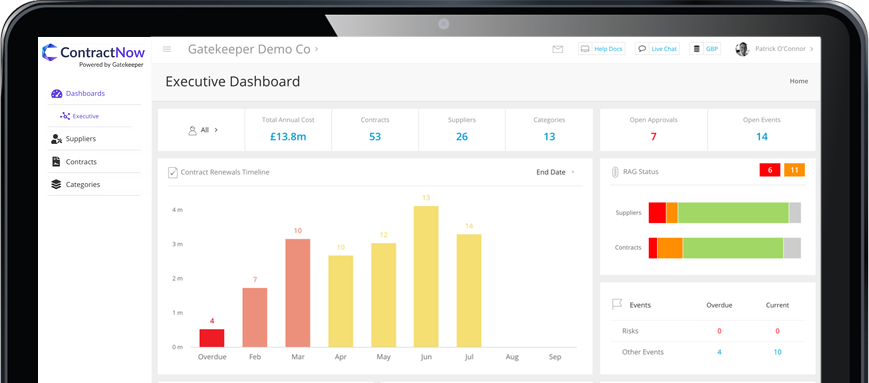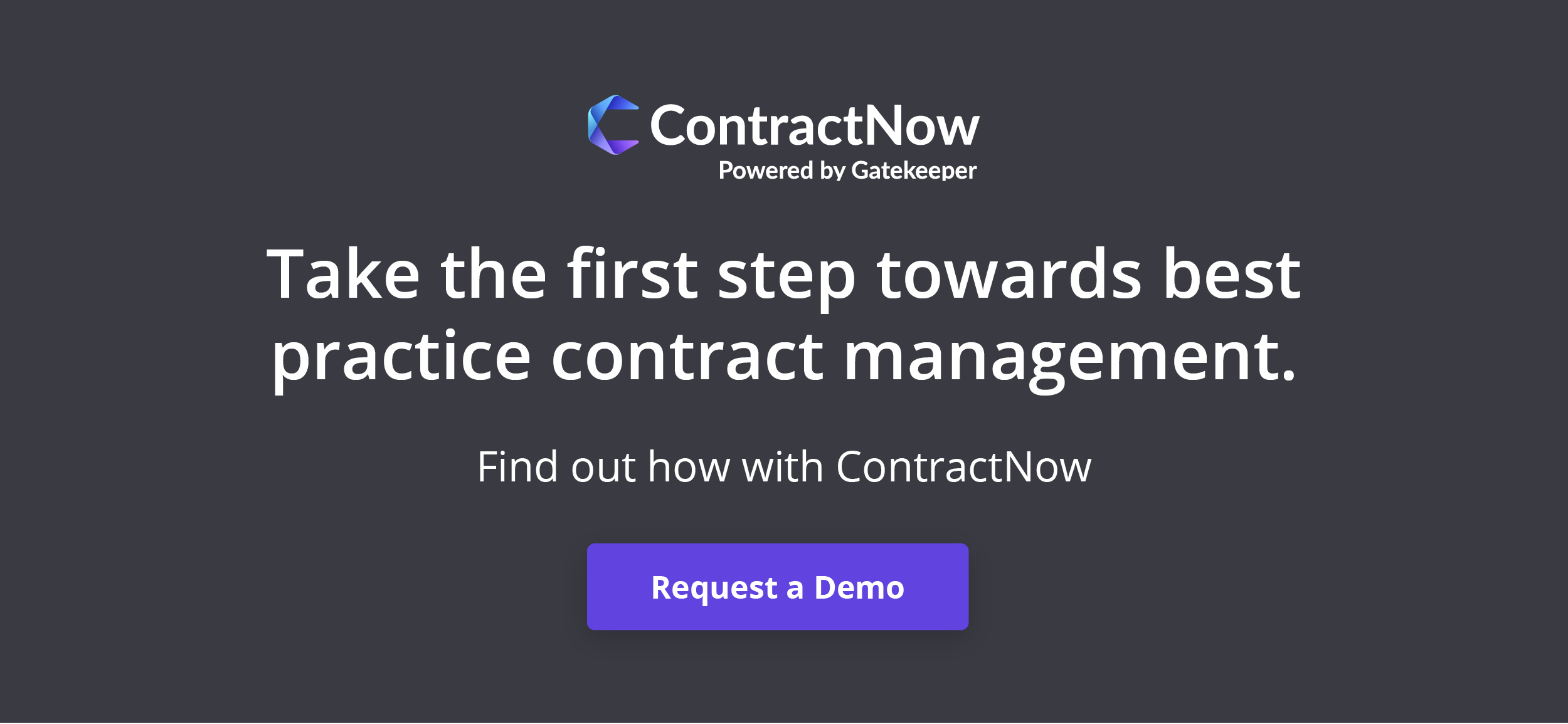While Contract Administration and Contract Management are terms that are used synonymously, they are very different practices that demand their own focus and activities.
Effective contract administration processes lay the foundation for, and work in tandem with, contract management best practices.
While both have an important role to play in the amount of value that is extracted from contracts, it’s important that the right amount of focus and dedication is given to each area. If you haven’t got your contract administration processes in order, then your contract management practices will soon fall down.
In this article, we take an in-depth look at what contract administration is, what successful contract administration looks like and how dedicated contract management software can improve both areas within any organisation to drive better results.
These can include overall internal efficiency, improved contract benefits realisation and accurate decision-making.
Contract Administration Definition
Contract administration can be defined as the process of extracting, recording and storing all relevant contract metadata and documents.
This information needs to be made accessible to approved individuals across the organisation, kept up-to-date and referred back to during decision-making activities such as the renewal process.
What is the role of a contract administrator?
The high level definition of Contract Administration makes it sound like a simple process, yet contract administrators will be responsible for a variety of different tasks at any given time.
Roles and responsibilities of a Contract Administrator can quickly expand depending on the size of the business, the complexity of the contracts, the number of contracts and how many touchpoints the contract will go through.
A day in the life of a Contract Administrator will typically involve:
- Setting up contracts
- Collecting information such as Requests for Proposals (RFPs)
- Sending contracts for approval and signatures
- Extracting and recording relevant metadata such as renewal dates
- Storing relevant documentation against the contract record
- Updating information periodically for accuracy
- Sharing the information with relevant people across the business
- Advising key stakeholders of forthcoming renewal dates
Administrators must have a holistic, up-to-date knowledge of all contracts so that this can be shared across the business – especially if terms change, disputes arise or obligations aren’t being met.
What are the keys to successful contract administration?
As you can see, the role of a Contract Administrator is varied with responsibility for lots of moving parts. The way contract metadata is handled lays the foundation for understanding, decision-making and even relationship-building between the business and its suppliers.
There are three keys to successful contract administration - whether your business is managing contracts with spreadsheets or a dedicated software:
1. Accessibility
Contract Administrators will devote their time to extracting and recording information, but if this isn’t accessible to key individuals within the business, the exercise becomes redundant. This is especially true in businesses that don’t have a centralised contract repository.
If extracted data is kept in multiple spreadsheets, shared drives and even filing cabinets, it can be difficult to find required information. Time is then lost to searching for contracts and the task of finding specific documents, metadata and even clauses becomes difficult.
Individuals and teams across the business should be spending their time working towards larger business objectives, rather than hunting around for information."
Centralisation is key to successful contract administration because it provides the business with a single source of truth. Anyone who requires information can quickly find it from a single, up-to-date location. This then helps to drive improved visibility, accessibility and efficiency.
2. Accuracy
Contract Administrators need to ensure that all data is captured accurately. If data isn’t captured, or is captured incorrectly, the consequences can be severe.
If key dates are captured incorrectly, for example, renewal dates can easily pass by without anyone noticing - leading to unnecessary spend. If this spend goes undetected, businesses could ultimately face financial risk.
If relevant documentation isn’t captured at all, such as certificates and their expiry dates, businesses expose themselves to regulatory risk as compliance can’t be proved.
If accurate data-capture isn’t prioritised, businesses can find themselves in situations where poor decisions are made, contract risk is heightened and relationships with suppliers are negatively impacted.”
3. Collaboration
Much like the contract management process, contract administration requires seamless collaboration across multiple departments – especially in larger businesses. For administrators, version control lies at the heart of these collaboration efforts.
In most contracting processes, a combination of Procurement, Sales, Finance and Legal teams will handle the contract before it’s signed off – potentially changing the terms of a contract based on individual conversations.
If these edits aren’t consolidated and occur in silos, the business could be at risk of working from the wrong contract. In the longer term, this could lead to misunderstanding about expectations."
Effective contract administration requires an auditable and defensible approach to version control. Administrators will need to communicate with each department and record any changes in the metadata.
How dedicated software can improve your contract administration process
The difference between contract management and contract administration is that contract management is the strategic process that is applied to every stage of the life cycle. Ultimately, effective administration paves the way for effective management.
If you recognise the symptoms we’ve outlined throughout this article and summarised below, your contract administration process will lead to poor contract management. Symptoms include:
- Disparate data sources/lack of central repository
- Multiple versions of the same contract
- Manual data entry
- Missing or inaccurate contract metadata
- Too much time being spent searching for information
By investing in dedicated contract management software, you will be able to improve your administrative processes – creating a frictionless and more accurate experience across the entire business. Let’s look at how.
1. Centralised contract repository
Investing in the right software will give you access to a cloud-based contract repository. This allows approved individuals to securely access contracts from wherever they are - whether that’s a different department or geographic location. Contract metadata is stored centrally and accurately.
Any changes that are made are captured for all to see, with a complete audit trail of who has made a change or taken an action and when. This contributes to improved visibility across the organisation, so everyone can have confidence in the data they are working with.
By capturing and storing contract metadata in a single location, efficiency is created for teams that would otherwise be overwhelmed."
Data is no longer fragmented, so hours are no longer lost to trying to find contracts, documents or any other relevant information. Instead, teams can focus their efforts on driving more value from existing contracts.
 ContractNow's Executive Dashboard
ContractNow's Executive Dashboard
Eliminated manual errors
Contract management software automates your data entry process. At a high level, automation means that data extraction and records will be standardised, happen more efficiently and – most importantly – accuracy will be achieved.
When you no longer have to rely on manual data entry, human errors can be eliminated. Data won’t be keyed in inaccurately, critical information won’t be missed and any anomalies can be easily identified and corrected.
Automating data entry and improving accuracy leads to:
- Clear understanding of contract obligations
- Accurate decision-making across the business
- Being able to act ahead of renewal dates
- Up-to-date performance and spend reports
- Improved risk and compliance management
Seamless collaboration regardless of business size
Businesses that are still using Excel, shared drives or paper contracts as part of their contract administration process will never be able to collaborate in a frictionless manner.
Frustrations can occur around version control, access, miscommunication (if any communication at all) and different decisions being made based on different data.
These problems will augment in businesses that are looking to scale, whether in terms of company size, number of contracts handled or their complexity. Issues can go undetected, changes to terms can slip through the cracks and different departments will have different processes and expectations."
By investing in contract management software, your administration process can be standardised company-wide and will be backed up by fully defensible audit trails.
These will show a complete history of any changes made, including who made edits and when. Not only does this create greater business resilience, but it also supports compliance efforts.
Summary
Contract administration processes that are underpinned by disparate systems will only ever get your business so far.
By investing in a dedicated contract management solution, you can bring efficiency, accuracy and centralisation to your business. This saves time, brings to light any hidden costs and helps to improve your business’s compliance efforts.
If you want to know more about improving your contract administration processes, or how ContractNow can help, contact us today.




